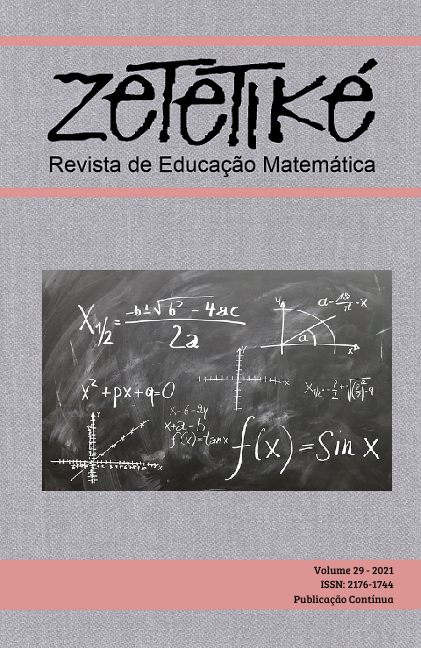Abstract
TPACK (Technological Pedagogical Content Knowledge) conceptualizes the teacher’s professional knowledge for an effective integration of technology in education, which is often a challenge in mathematics teaching. Since it is essential to guarantee its development in pre-service mathematics teacher education, this study aims, following a Design-Based Research, to understand how the design principles adopted in a teacher education experience centred on developing the TPACK of mathematics prospective teachers (PTs) of 7th to 12th school years contribute to promote this knowledge. The results, based on the analysis of PTs’ written solutions of the tasks proposed in the teacher training and responses to an interview and questionnaire, show that the teacher education experience promoted PTs’ technological skills, evidencing the mobilization of TK (Technological Knowledge), TCK (Technological Content Knowledge) and TPK (Technological Pedagogical Knowledge) in articulation with the PCK (Pedagogical Content Knowledge) and, consequently, the TPACK.
References
Albuquerque, C., Veloso, C., Rocha, I., Santos, L., Serrazina, L., & Nápoles, S. (2006). A matemática na formação inicial de professores. Lisboa: APM e Secção de Educação e Matemática da SPCE.
Association of Mathematics Teacher Educators (AMTE) (2017). AMTE Standards for Preparing Teachers of Mathematics. Available in: http://www.amte.net/publications.
Canavarro, A. P. (2011). Ensino exploratório da Matemática: Práticas e desafios. Educação e Matemática, 115, 11-17.
Cobb, P., Confrey, J., diSessa, A., Lehere, R., & Schauble, L. (2003). Design experiments in education research. Educational Researcher, 32(1), 9–13.
Costa, F. (Coord.), Peralta, H., Rodrigues, A., Dias, P., Osório, A. J., Gomes, M. J., Ramos, A., Ramos, J. L., Sebastião, L., Maio, V., & Valente, L. (2008). Competências TIC. Estudo de Implementação (vol. I). Lisboa: GEPE-Ministério da Educação.
Coutinho, C. P. (2011). Metodologia de Investigação em Ciências Sociais e Humanas, Teoria e Prática. Coimbra: Edições Almedina.
Earle, R. S. (2002). The integration of instructional technology into public education: Promises and challenges. ET Magazine, 42(1), 5-13.
Grossman, P. L. (1989). A study in contrast: Sources of pedagogical content knowledge for secondary English. Journal of Teacher Education, 40(5), 24–31.
Gutiérrez-Fallas, L. F. (2019). O conhecimento tecnológico e pedagógico do conteúdo (TPACK) na formação inicial de professores de matemática do 3.º ciclo do ensino básico e do ensino secundário. Tese de Doutoramento, Universidade de Lisboa, Portugal.
Gutiérrez-Fallas, L. F., & Henriques, A. (2020). O TPACK de futuros professores de Matemática numa Experiência de Formação. Revista Latinoamericana de Investigación en Matemática Educativa, 23(2), 175-202. https://doi.org/10.12802/relime.20.2322
Koehler, M. J., Mishra, P., Kereluik, K., Shin, T. S., & Graham, C. R. (2014). The technological pedagogical content knowledge framework. In J. Spector, M. Merrill, J. Elen, & M. Bishop (Eds.), Handbook of research on educational communications and technology (pp. 101-111). New York, NY: Springer.
Krumsvik, R. J. (2014). Teacher educators' digital competence. Scandinavian Journal of Educational Research, 58(3), 269-280.
Leung, A. (2017). Exploring techno-pedagogic task design in the mathematics classroom. In A. Leung & A. Baccaglini-Frank (Eds.), Digital technologies in designing mathematics education tasks: Potential and pitfalls (pp. 3–16). Cham: Springer.
Mishra, P., & Koehler, M. J. (2006). Technological pedagogical content knowledge: A framework for integrating technology in teachers’ knowledge. Teachers College Record, 108(6), 1017–1054.
National Council of Teachers of Mathematics (NCTM) (2014). Principles to actions: Ensuring mathematical success for all. Reston, VA: Author.
Niess, M., & Gillow-Wiles, H. (2017). Expanding teachers’ technological pedagogical reasoning with a systems pedagogical approach. Australasian Journal of Educational Technology, 33(3), 77-95.
Niess, M. L. (2012a). Rethinking pre-service mathematics teachers’ preparation: technological, pedagogical and content knowledge (TPACK). In D. Polly, C. Mims and K. Persichitte (Eds.), Developing technology-rich, teacher education programs: Key issues (pp. 316–336). Hershey, PA: IGI Global.
Niess, M. L. (2012b). Teacher Knowledge for Teaching with Technology: A TPACK lens. In R. Ronau, C. Rakes and M. Niess (Eds.), Educational technology, teacher knowledge, and classroom impact: A research handbook on frameworks and approaches (pp. 1-15). Hershey, PA: IGI Global.
Oliveira, H., Henriques, A., & Gutiérrez-Fallas, L. F. (2018). A integração da tecnologia na planificação de aulas na perspectiva do ensino exploratório: um estudo com futuros professores de Matemática. PERSPECTIVA, 36(2), 421-446.
Ponte, J. P., & Chapman, O. (2008). Preservice mathematics teachers’ knowledge and development. In L. English (Ed.), Handbook of international research in mathematics education (2nd ed., pp. 225–263). New York, NY: Routledge.
Ponte, J. P. (2012). Estudiando el conocimiento y el desarrollo profesional del profesorado de matemáticas. Teoría, crítica y práctica de la educación matemática, 41, 83-98.
Ponte, J. P., Carvalho, R., Mata-Pereira, J., & Quaresma, M. (2016). Investigação baseada em design para compreender e melhorar as práticas educativas. Quadrante, 25(2), 77-98.
Shulman, L. S. (1986). Those who understand: Knowledge growth in teaching. Educational Researcher, 15(2), 4–14.
UNESCO (2008). ICT Competency Standards for Teachers. Policy Framework. Paris: UNESCO.

This work is licensed under a Creative Commons Attribution-NonCommercial-NoDerivatives 4.0 International License.
Copyright (c) 2021 Zetetiké


